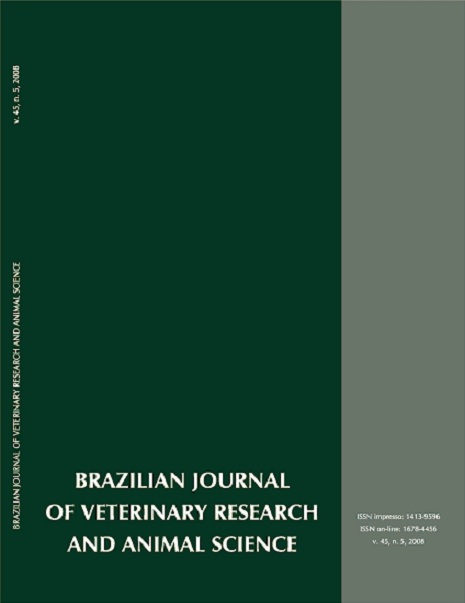Antigenic characterization of canine parvovirus isolates from Brazil using specific monoclonal antibodies
DOI:
https://doi.org/10.11606/issn.1678-4456.bjvras.2008.26680Keywords:
Canine parvovirus, Haemagglutination inhibition, Antigenic characterization, Monoclonal antibodiesAbstract
Canine parvovirus (CPV) is an emerged pathogen in dogs, first isolated in 1978 in the USA. The original 1978 strain was designated CPV type 2 (CPV-2). However, analysis of CPV isolates in the USA by restriction enzymes and monoclonal antibodies have shown that around the year 1979 a CPV variant strain, designated CPV type 2a (CPV-2a), became widespread. Subsequently, a new antigenic strain, designated CPV type 2b (CPV-2b), was also observed by analysis of CPV isolates from various parts of the world, although the proportion of each strains was different between countries. In this study, the Haemagglutination Inhibition (HI) test with a panel of monoclonal antibodies was used to type canine parvovirus strains in 29 fecal samples collected from symptomatic dogs from 1980 to 1986 and from 1990 to 1995. The results showed a strong predominance of the antigenic type 2a indicating that the CPV epizooty in Brazil followed the same pattern observed in European and Asian countries.Downloads
Download data is not yet available.
Downloads
Published
2008-10-01
Issue
Section
UNDEFINIED
License
The journal content is authorized under the Creative Commons BY-NC-SA license (summary of the license: https://
How to Cite
1.
Pereira NA, Monez TA, Pereira CAD, Richtzenhain LJ, Durigon EL. Antigenic characterization of canine parvovirus isolates from Brazil using specific monoclonal antibodies. Braz. J. Vet. Res. Anim. Sci. [Internet]. 2008 Oct. 1 [cited 2024 Apr. 26];45(5):385-9. Available from: https://www.revistas.usp.br/bjvras/article/view/26680





